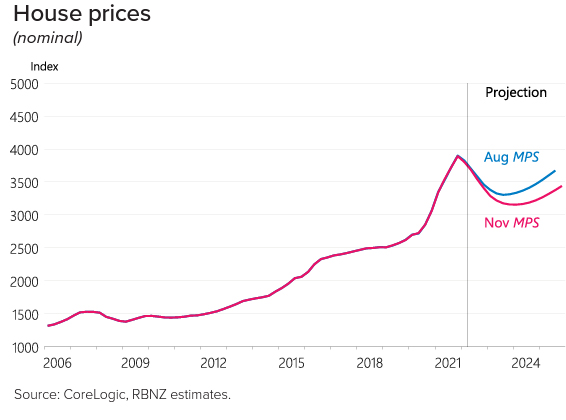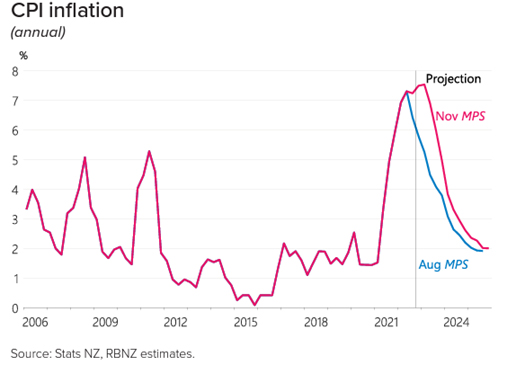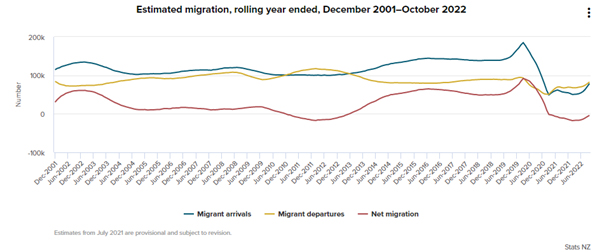
With the page having turned on another year, it is time again to engage in the tradition of crystal ball gazing, making big picture predictions on developments and factors that will influence markets and portfolios in the year ahead.
Before that, a quick recap on the year that was. As was the case with the year previous, 2022 was anything but dull. Markets largely moved on from Covid, and as the year wore on, focussed on the fight against another invisible enemy in the form of inflation, one which was fortified further by the war in Ukraine. The concern over the extent and duration of interest rate tightening programs by the world’s central banks was a prevalent theme throughout the year.
Looking back on our top 10 predictions from a year ago, there were certainly more hits than misses. The “Great Rotation” from growth to value did indeed click up a few gears, while a harsh dose of reality did set in for investors in crypto-currencies. The kiwi housing market did indeed weaken more than most expected while workers both at home and abroad became more pay-packet conscious. The groundswell for a third supermarket operator in NZ was not as loud as it could have been, but the prediction that tensions would ratchet higher on the geopolitical front proved to be somewhat of an understatement, given Russia’s invasion in the Ukraine.
Markets generally were not resilient, although the kiwi market did hold up better than many counterparts. Our predictions that the world’s central banks would call the tune throughout the year was on point, and while inflationary fears did not disappear, there were signs that inflation had peaked in the latter stages of the year.
What will 2023 dish up?
No one knows exactly, but below is a list of how the ‘Top Ten’ may play out in terms of big themes this year.
1. The “most anticipated” recession in history proves more benign than anticipated
Recessionary fears were increasingly priced into markets over the course of 2022, on the view that much of the world will see a downturn this year. The patient is coming off its medicine as it were, with the tremendous amount of stimulus administered during the pandemic being withdrawn. This is forecast to produce a global economy in which growth wanes and unemployment is on the rise.
Markets are pricing in a recessionary scenario this year, with some economists seeing the probability of a downturn at close to 100%. Not many things in life have a 100% probability, and it is conceivable that once again that the worst-case fears (just as was the case in March 2020 at the start of the pandemic) do not eventuate.
For the soft-landing scenario to emerge, a central plank would be that inflation moderates more quickly than expected (we have already seen signs of this in early 2023 with inflation prints across Europe). With global supply chains opening up and growth moderating (but not collapsing), it is entirely possible that two primary levers of inflation work together in a conducive manner. The latter could also dampen wage pressures as unemployment rates return to more sustainable levels.
Such a scenario could set the stall for a significant snap back in equity markets, given considerable negativity has already been priced in. Much of course will depend on the Fed (and other central banks), but recent signals have provided cause for optimism. The recently released Fed minutes indicated that officials will make rate decisions on a ‘meeting by meeting’ basis. Nothing is pre-destined, and this potentially also goes for arguably the “most anticipated” recession in living memory (and despite US Q422 GDP growth tracking at nearly 4%).
This also presumes a base case where the war in Ukraine continues to drag on. Any move towards the negotiating table (possibly driven by increasing public opposition in Russia) would be very well received by markets.
2. China’s reopening helps blunt some of the impact, with easing trade global tensions also a good thing
While there has been much concern over a slowdown in global growth this year, a key mitigating factor is that one of the world’s biggest growth engines has followed a very different reopening trajectory since the onset of the pandemic. China was where it all began, but after a lockdown which has lasted more than 1,000 days, the country is opening up to the rest of the world (the country’s borders reopen on 8 January) .
A stringent Covid-zero policy has been an economic handbrake for China, which has also been grappling with a creaking property sector. Optimism has however increased following the government’s 16-point plan. Emboldened after securing an historic third leadership term in October, but also mindful of recent domestic protests against Covid-zero restrictions, President Xi now appears focussed on making up for lost time. The focus in 2023 is now on economic growth.
China's economy grew at around 3% in 2022, well short of official targets of around 5.5%. The World Bank expects the reopening of China's economy will lift growth to 4.3% in 2023. Nearer term, there are concerns over how a consequent surge in infections will impact the economic rebound in the country. However, just as was the case in the West, Chinese consumers will be emerging from their lockdown with stronger household balance sheets – time will tell how quick they are to spend these reserves.
An eagerness for China to get back on the growth path could also lead to a cooling of trade tensions which have built up during a period of confinement. We have already seen some cause for optimism here, with reports that China is looking at resuming imports of Australian coal after a two-year ban.
3. NZ’s economic downturn is exacerbated by mortgage holders rolling off pandemic fixed deals. Discretionary consumer spending heavily pressured
Arguably the “forthcoming recession” is one of the most predicted in living memory. The “R’ word is being regularly used in the mainstream commentaries, with investors and consumers alike being prepped for this scenario. The RBNZ itself now expects four quarters of negative growth from the June quarter of this year onwards (-0.5%, -0.3%, -0.1% and -0.1%).
The NZ economy has surprised with its resilience at times, and some further help could be forthcoming from a well-known quarter. The re-opening of China, our largest customer, could come at just the right time to soften the economic headwinds which are being faced elsewhere.
There are still some key domestic areas which look to be facing some stern challenges. The notion that consumer activity will not be dented by falling house prices (despite the negative wealth effect on sentiment), as suggested by some commentators, feels very optimistic. Rising interest rates are more than just “annoying” and have real-life consequences for someone moving from a mortgage rate with a ‘2’ in front of it to a ‘6 or a 7.’ Around two-thirds of kiwi mortgage holders are set to come off fixed mortgage rates in the next six months. Households fortified their finances during the pandemic, but these funds will be called upon. Consumers are therefore going to be less likely to “splash out” on discretionary (particularly bigger ticket) items.
The notion that consumers will not be worried because there are plenty of jobs also may be brought into question. The RBNZ is expecting unemployment to rise from 3.2% to 4.8% by year end, and 5.7% by 2024. Growing concerns over household finances and job security could well exert pressure on discretionary spending this year.
4. Kiwi housing market continues to weaken through the year, equalling the peak to trough downturn seen in GFC.
It was only just over a year ago that many economists were predicting that New Zealand’s housing market would “hold together” over the course of 2022 and would be immune to the inevitable increase in interest rates as inflation ticked higher. In our predictions this time last year, we suggested this would not be the case, with house prices falling more than most expected. Such proved the case, and during the year many forecasters pivoted to the view that NZ house prices would undergo a substantial correction, with most initial assessments in the region of 10-15% from their peak levels in 2021.
House prices have been falling but over the course of calendar year 2022 were still only down nationally around 5% (according to CoreLogic). This is the largest annual decline since June 2009, but still compares to a property market which rose by over 30% at the peak during the pandemic. New Zealand’s property market was expensive by global standards heading into the pandemic, marked by elevated price-to-income and price-to-rent ratios. This situation will need to correct further and will ultimately be aided by a degree of selling as mortgage holders trade down amidst elevated mortgage rates. A peak to trough fall of 20%+ (more in real terms) is therefore not inconceivable.

5. The OCR tops out sooner than expected as RBNZ realises it has gone too hard. Inflation gets back to within the band, at around 3%
The RBNZ rounded out 2022 in hawkish fashion, increasing the OCR by 75bps to a 14-year high of 4.25%, and contemplating a 100bps move. Officials expect the OCR to peak at 5.50% in September this year and remain at this level through to June 2024.
It could be argued that the RBNZ is being consistent, having been one of the first central banks in the world to raise rates last year, and wanting to stay the course until the job against inflation is done. Against this backdrop, the RBNZ is forecasting annual CPI inflation to hit 7.5% in the December 2022 and March 2023 quarters before tracking lower, but not going below 3% until September 2024.
A plausible scenario is one where inflation, which rose much quicker than officials anticipated, now does the same on the other side and falls away faster than the Reserve Bank anticipates. Falling energy prices and a firmer currency could quickly change the game as it relates to imported inflation. This is already happening in other countries, with recent inflation prints in Europe, the US and Australia coming in below expectations. Robust commodity prices are a headwind to this scenario but weakening pockets of domestic activity, particularly in housing and construction markets, would be deflationary and also provide a harder economic landing than expected by central bank officials – this would be one they would need to react to.
It is therefore conceivable that inflation gets back to the RBNZ’s band, and below 3%, sooner than 2024, and potentially in the latter stages of 2023. This type of an inflationary trend through the year, and a deteriorating economy, could well prompt a more dovish pivot by the RBNZ, with the OCR not reaching 5.5%, and topping out some time in the middle of the year.

6. Commodities remain buoyant, with a long-term deal locked in with Rio over Tiwai Point
Commodity prices remain buoyant in 2023, helped by an easing US dollar, and also as demand in China picks up amid the pivot from Covid-zero (which will more than compensate for an easing of demand elsewhere). Aluminium prices remain well above US$2000, making New Zealand’s Aluminium Smelter (NZAS) at Tiwai highly profitable, and one of the most environmentally friendly smelters globally. Tiwai averages around two tonnes of CO2 per tonne of carbon produced, versus an average of over six times that for aluminium smelters globally.
While accounting for around 12% of New Zealand’s electricity, roles will be reversed at the negotiating table and Rio will be eager to lock in a long-term supply deal with Meridian. Tighter rules around “sweetheart” wholesale power deals will also be to Meridian (and Contact’s), benefit with higher prices being negotiated, and also given the fact that supply is not trapped to the extent it was last time terms were agreed.
An eagerness to get a deal done will also see NZAS make assurances to the (new) government around emissions, better waste management, power “co-operation” during peak periods, and a pledge to invest in and support new renewable generation projects.
7. Brown gets moving on strategies around the port (moving it)
As highlighted in an opinion piece last year (click here to view the article) the Ports of Auckland has been a sense of consternation for many Aucklanders. Since being taken off the NZX, the port has seen a huge amount of value destruction, underperforming financially and operationally under full council ownership, while also having an appalling safety record. No surprise that the Ports was once again centre of attention in last year’s mayoral race.
A clear election promise by Wayne Brown has been to sort the issue of the port once and for all. Having already made significant noises around plans to overhaul the port, 2023 will be the year that Brown (unlike the botched automation project) swings into action and pushes the boat out on his plans.
Brown will ensure there is more detail on the phased timeline to return waterfront land “to the people of Auckland” from 2024, as well as easing congestion in and around the CBD. After years of circular arguments, tough decisions will be made and set into motion. This will likely see some executive management changes at the port itself. Container freight will be transitioned to rail, and the vehicle operations will head to Northport. The roadmap will be also laid out for the overall port operations to actually become commercial and to the benefit of Auckland ratepayers. Better late than never.
8. The National coalition wins election in comprehensive fashion, economy front and centre
Time and broken promises will be the enemies for Labour as the Government attempts in vein to secure a third term at this year’s general election (the 30th anniversary of MMP as it goes). With New Zealanders having been rocked by unprecedented cost-of-living pressures and low wage growth, the move for many homeowners to unpleasantly high mortgage rates will be too much to bear for voters. With the economy likely to be in recession, it will be National and ACT’s election to lose.
With the economy at the centre of the campaign, National under Christopher Luxon will widen the gap on Labour as the election draws closer. The ACT Party will also have a very strong showing, with David Seymour’s constructive “arrogance” continuing to score points, and helping to give the Coalition a resounding victory. Law and order will also be a big focus for voters with Labour seen as soft on crime. Luxon and Seymour will win hearts with a promise to bring an end to the all too regular news of ram-raids and attacks on dairy owners.
9. The ‘Brain Drain” resumes in force to Australia (and elsewhere)
The levels of “Brain Drain” reversed during the heights of Covid, which was of little surprise. Our borders were closed to non-residents, and kiwis abroad were urged to return home, amidst the government’s stringent pandemic restrictions and low case numbers, which positioned Aotearoa as a safer place to nest during the outbreak.
With the virus now largely in the rear-view mirror, New Zealand will be an appealing destination to many non-New Zealand citizens in 2023, which will be helpful to the hospitality and education sectors amongst others.
However, deteriorating economic conditions, lower relative wages, and a structurally higher cost of living than many other countries will all be incentives for the Brain Drain to resume. A housing market which will remain one of the most unaffordable globally (even after the correction noted above) will further dent the inclination for kiwi workers to stay put. An Australian economy which holds together much better than New Zealand’s this year will also cause many kiwi workers to take flight across the Tasman in particular.

10. With a number of challenges ever present, market conditions remain productive for active value-oriented investors
Last year presented its fair share of challenges for markets, but it was one in which active, value-oriented investors were presented with a productive environment. While most markets were softer, ‘growthier’ sectors came under much more pressure. Market dynamics, amidst elevated levels of inflation and the onset of a global rate tightening phase, also raised questions around the merits of “passive” versus “active” investing strategies.
Passive investing strategies have arguably suited many investors well during the bull market, but equally, active strategies often start to display their credentials in a scenario where “a rising tide no longer lifts all boats.” Given the ambiguity around where inflation, interest rates, and a raft of economic data are likely to end up, this environment could well remain in force in 2023.
From a style perspective, the rotation from growth to value gained momentum in 2022. While interest rates are unlikely to rise at the same vicious pace in 2023, they are unlikely to fall quickly either. This could continue to present a headwind for growth companies that fail to deliver on expectations. Those that do meanwhile will be rewarded.
Active investors by definition are nimble and can adapt to a world where change is happening at an extraordinary rate and the implications of disruptive forces can create major challenges In such an environment, those that understand the relationship between fundamentals and price stand a better chance.
As a value-oriented manager, our approach at Devon Funds continues to be seeking out and maintaining exposure to high quality companies with excellent investment credentials, including strong track records, robust balance sheets, great management, robust competitive moats, and strong long-term earnings prospects. Ticking all these boxes, and ensuring that we are paying the right price for each business, is essential in our view to driving performance outcomes over the next stage of this cycle.
And from the left of field……
11. Argentina do the ‘double’ and win the Rugby World Cup
The 2023 Rugby World Cup in France promises to be one of the most hotly contested yet. The All Blacks safely navigate the Group stage but are beaten by Ireland in the quarters. Hosts France make it to the final however are tripped up by Los Pumas as Argentina matches its football world cup triumph, lifting the Webb Ellis Cup for the first time.
Devon Funds Management is an independent investment management business that specialises in building investment portfolios for its clients. Devon operates a value-oriented investment style, with a strong focus on responsible investing. Devon manages six retail funds covering across the universe of New Zealand and Australian equities and last year launched two new international strategies with a heavy ESG tilt. For more information, please visit www.devonfunds.co.nz
Greg Smith is Head of Retail at Devon Funds Management. This article is here with permission.
16 Comments
Greg just got the year wrong, there will be good opportunities for investors to buy in 2024. As no one knows when the true bottom of the market is (except in hindsight), it's wise to let the market truly bottom out before buying rather than buying into a small recovery (dead cat bounce). Sure, this means that an investor will miss the absolute bottom of the market, but it's a price well worth paying, to avoid buying into a further downturn
Interesting points, I would argue against points 1, 10 & 11. Point 5, yes OCR will top out sooner but no, (or despite) CPI will not return to 3%. Point 7, I truly hope Greg is right and that Brown gets the ports moving.
Yvil,
I don't live in Auckland, so in that sense, don't have skin in the game. I do however have shares in Marsden Maritime(MMH), so might benefit from that. But I struggle to understand how moving the vehicle imports there would make sense at least until the rail network is adequate to then move them south again to where people actually need them. Can you really imagine them all on these roads?
Perhaps I will be proved wrong, but i think Aucklanders might come to regret making Brown their mayor.
I think Brown will be gone within a year, his position will be untenable.
Being a mayor is about consensus building and collaboration, it’s not a ‘presidential’ role. It sounds like he’s pissed off a whole lot of people in the short time he’s been in office.
Great, keep pissing people off and GET SHIT DONE !
My 3 bets:
1. Inflation stays higher for longer due to Supply Chain disruption (eg from eggs to CO2) , Wage Price Growth, rising Commodity Prices.
2. As a Consequence the OCR will get to a 6 in Q3
3. Gold and Silver become BBQ conversation topics from those that see House Price declines and seeking new options to preserve wealth.... OR realising the BRICS and now using it to Trade outside the USD .
Gold and Silver become BBQ conversation topics from those that see House Price declines and seeking new options to preserve wealth.
They're 3-4 years too late I reckon. There are quite a few bearish calls on gold in my circles. Some even suggesting a 20-year bear market is about to begin.
Keen to hear your opinion as to why that would be the case.
Well, he would naturally support active investment. Unfortunately, the evidence is heavily against active as opposed to passive investment.
This can be very clearly seen from the S&P SPIVA index.. To take just one example; over 89% of Large Cap US funds underperformed the S&P 500 Index. Here's a quote from the Nobel Laureate economist Eugene Fama; "After taking risk into account, do more managers than you'd see by chance outperform with persistence? Virtually every economist who studied this question answers with a resounding no".
I run my own portfolio, but if i did not, I would invest in a number of index funds.
Well, he would naturally support active investment.
Gotta get paid.
If someone was looking to invest this year, what should they buy. You recommended MFB the other day as a speck buy. Thanks
Good piece, pretty much agree with it all apart from No. 11, lol.
France to win the cup
South Africa and Ireland in with a good chance too.
This is pure copium. An acid trip in the bush at night has fewer delusions than this article.
Where does the inflation disappear to? Why does it simply ease? What is the cause? The inflation metrics used by the Fed and RBNZ are both massaged nonsense, overweighted with substitution bias and overweighting of naturally price deflationary products (tech). A peek at the chapwood index suggests we have been slowly inflating more and more.
Where does this China nonsense come from? The Biden admin and most of the West have clicked to "fuck china" and have continued moving to protectionist trade policy. The CCP itself has moved towards Dirigsme-esque state directed capitalism, with no reason to see economic/political tensions decrease. The trend is against globalisation, boomers need to click to this. Globalisation worked when you had Dirt Cheap Commodities out of Russia after the USSR collapsed, Dirt Cheap Labour out of China and very high interest rates which have gradually decreased since 1981 with a huge cohort of young boomers who enjoyed the fruits of cheapening credit, outsourcing and the rise of financed consumerism since. It will not work in a debt burden, worker scarce, aging society with a heavily industrialised China and a militant Russia.
Same copium nonsense on housing? Construction industry lives off those capital gains, tons of tradies take payment in land and houses on these projects. Who is going to buy these properties at these prices and these interest rates? Sure you can hold as long as you like; but every divorce, death, displacement and job change is going to drive the property market down. Each edge downward will break the back of more bank bound slaves, who will be forced to sell for losses. Even if inflation subsides (it has no reason to given supply shocks, lack of investment in oil/gas infrastructure under ESG, commodities bubble kicking up), there is a huge cohort of retiring or retired people who can't sell their excessively large properties.
The sheer number of retirees selling assets as they retire, vs the tiny wealth proportions held by millennials looking to acquire them is going to smash the returns on housing, stocks etc.
This is pure copium. An acid trip in the bush at night has fewer delusions has than this article.
Love your work VM.
The Chatswood index makes for scary reading. Anyone know if NZ is being fed the same under-measured CPI bullshit that the USA gets?

We welcome your comments below. If you are not already registered, please register to comment
Remember we welcome robust, respectful and insightful debate. We don't welcome abusive or defamatory comments and will de-register those repeatedly making such comments. Our current comment policy is here.